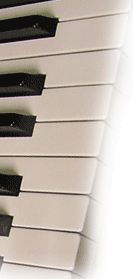
Q: Is new ivory available? I thought you couldn't get it anymore.
A: Ivory is available, it is not new, it is called pre-ban ivory. This means ivory that was in the country prior to the 1989 ban can be used. Many museums and private estates sell their ivory to collectors and artists for any legal use. Ivory can no longer be imported or exported from the U.S.
Q: What are natural keytop materials?
A: Natural keytop materials are wood, ivory, bone and ebony.
Q: What are synthetic keytop materials?
A: Synthetic keytop materials are any of the many forms of plastic.
Q: What is mineral plastic (Mineral Ivory)?
A: Mineral Plastic is a synthetic material with a very high mineral content. These minerals make for a plastic that looks and feels very much like natural materials such as the coveted ivory or bone. It is cool to the touch, it wicks-off moisture from the fingertips. Mineral plastic is widely used on European pianos and organs and is quickly gaining acceptance domestically for the same. Mineral plastic come in 3 shades, white, off-white and crème color.
Q: Why can't Elephant Ivory be brought into, or out of the United States?
A:The United States participates in the 1989 United Nations ban on importing or exporting Elephant Ivory.
Q: Can any form of Ivory be brought into, or out of the United States?
A: Yes, Ancient Wooly Mammoth Ivory can be shipped internationally without restriction, because the Ancient Wooly Mammoth is an extinct species.
Q: Why do some ivory and plastic keytops crack at the point where the head meets the tail, and some do not?
A: An unforgiving glue that won't allow the keystick to move or an unforgiving keytop (extremely hard plastic), will force the keytop to crack at it's weakest point, and an environment that experiences sudden and frequent changes in temperature or humidity.
![]()
